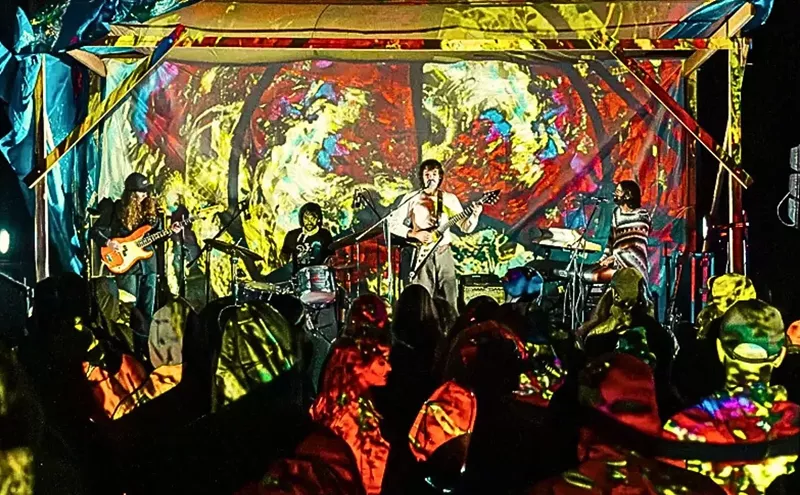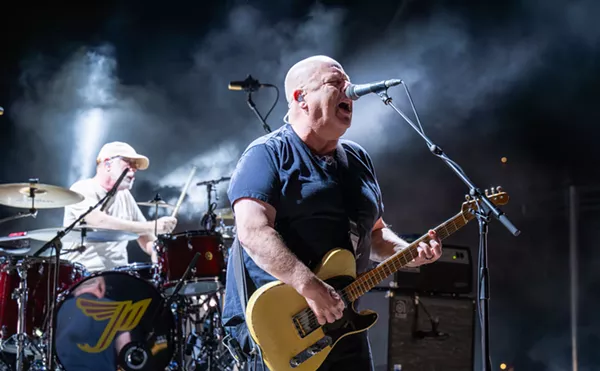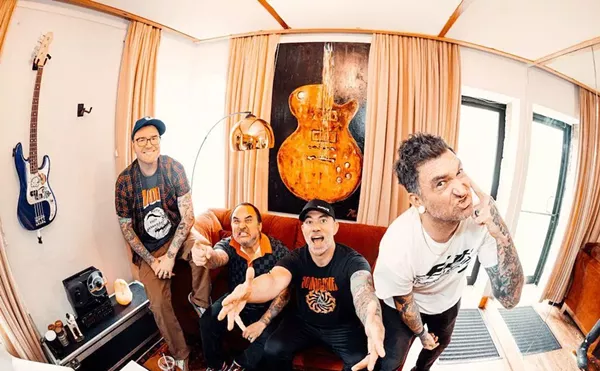Fox, a longtime booster of Denver music, co-founded Alley Records in 1994, and since then, he and his partners, Mike Nile and Chris Cardone, have signed seven Colorado acts: Cosmic Pond, Dave Delacroix, Avatar, Body of Souls, Jesus Monkeyfish, Sweet Water Well and Chaos Theory. Of these acts, Cosmic Pond is still together (the band issued its Alley Records debut two weeks ago), and both Delacroix and Avatar leader Maurice Avatar continue to perform in town, although Avatar no longer fronts the group Fox inked four years ago.
And the rest? Gone.
Body of Souls and Jesus Monkeyfish, a pair of hard-rock combos, called it quits soon after appearing on the 1994 release Alley Records 3 in 1. The members of Sweet Water Well, a celebrated neo-folk quartet with a well-regarded Alley Records disc, 1996's Watermelon, to its credit, announced that they were going their separate ways last September while accepting a prize at the Westword Music Awards Showcase--their third in the event's three years. And Chaos Theory, a rap-metal foursome that's been among Denver's biggest draws since the first half of the Nineties, quietly put its project to sleep a couple of months ago; this article marks the first public acknowledgment of the split.
For Fox, watching these musical divorces has been a sad experience. "We had a great roster, and I really thought we were going somewhere--but then the bands sputtered out on me," he says. "Which is the history of the Denver scene."
In many ways, Fox is right. The Denver area regularly produces bands that attract capacity crowds, but when it comes time to take the next step and triumph nationally, they fall short and eventually raise the white flag. The past couple of years have seen a staggering, arguably unprecedented number of such surrenders. The dead include cult idols (the Denver Gentlemen, Baldo Rex, the Hectics, the AUTO-NO), consistent club-packers (Chitlin, the 'Vengers, Love Lies, Sponge Kingdom), nationally known underground acts (Nebula 9, Deuce Mob, Element 79), roots practitioners (Bleecker Street, Chris and Maggie) and plenty more. At least two groups signed to deals with major companies have succumbed to the separation bug as well: Foreskin 500 was inked to Priority Records and landed a tune on the soundtrack to the Robert De Niro movie The Fan but gave up the ghost anyhow; the Subdudes, who put out albums on Atlantic Records and High Street, a subsidiary of Windham Hill, disbanded after a decade as a Colorado favorite. And several additional notables are in various stages of limbo, including Spell, which hasn't been on stage in these parts for the better part of a year; Monkey Siren, which changed its name to Action Sound Superband before virtually disappearing from the planet; and Furious George and the Monster Groove, which has been reduced by personnel changes to occasional reunion shows.
Still, the breakup that brought the phenomenon home for many live-music fans in Denver was the one that struck Lord of Word and the Disciples of Bass. The group was formed in 1992, and it didn't take long for it to become the city's most beloved party act--a status it never surrendered. But persistent label interest never led to a contract, and years of touring eventually left the players exhausted. Finally, according to bassist John Hamala, bandleader and frontman Theo Smith, aka Lord of Word, called a meeting at which he said "he was really tired and that he felt like he'd lost the feeling you need to have." The band played its final gig at the Fox Theatre on April 23.
That the Disciples of Bass didn't become the biggest act in show business does not in itself prove that making it from Colorado is all but impossible. Neither do any of the other fractures listed above; the circumstances specific to each case ensure that. But with so many well-liked bands disappearing and few candidates on the horizon that seem ready to take their places, something of a vacuum has been created. No doubt it will soon be filled, but when it is, a question will remain: Are the next Colorado luminaries doomed to the same fate that has claimed so many of their predecessors?
Theo Smith is a relentlessly upbeat person; he named Lord of Word's most recent CD Positive, and the title certainly reflects his outlook. It was no surprise, then, that he refused to grumble about the end of his band during an interview on the topic late last month. "I guess I just wanted to have a little more control over things and oversee things a little bit closer," he said between enthusing about the solo career he hopes to get off the ground by the end of the year. "But there's no animosity with members of the band or anything like that. It's just something that I've been thinking about and decided to do."
While discussing this topic, Hamala was not nearly as cautious as Smith. In his view, two of the factors that contributed to the group's dissolution were its failure to secure a record contract and the rigors of touring. The Disciples had no difficulty landing shows outside Denver, thanks to its connection with the Tahoe Agency, a powerhouse booking firm. But attempting to build audiences in far-flung locations eventually proved exhausting. "We would do two or three weeks at a time every couple of months," Hamala noted last month, "and that wasn't enough for them. But because the band is so big, touring was expensive. I was the road manager and did all the finances, so I can tell you that we made money at home. But even though we got good crowds on tour, we didn't make anything. And that was hard when you'd be out there playing sixteen shows in sixteen days in sixteen different places, especially if the routing wasn't right. Sometimes we'd get into a place, load, play and get to sleep at two or three in the morning, then have to be up at six in order to make a ten-hour drive to the next place. In some ways, that's typical of what bands have to go through, but for someone like me, who's been doing it for eleven years, it gets to be kind of a drag."
Indeed, Hamala had been through this pattern before. As bassist for the Jonez, another Denver act that locals fully expected to go national, he reached tremendous highs (like a rousing jaunt through South America) and dispiriting lows. "The worst was on one of our last tours," he recalled. "We had arranged with this guy to get us a motor home to travel in, but when we showed up, all he had was a semi. It's illegal to ride in the backs of those, but we didn't have any choice. So we put couches in there and rode around in it for a month, getting nauseous and claustrophobic, because there weren't any windows. Once, the drummer totally freaked out, wanting to get out of there, and we couldn't stop for fear of getting busted. We had to sneak in and out of it at gas stations. It was miserable."
Despite such travails, locals were still taken aback by the Jonez's early-Nineties separation. After all, Big Head Todd and the Monsters, who only a brief time earlier had been at approximately the same level of popularity as Hamala and his cohorts, had beaten the odds and were playing to big crowds all over the U.S. But the Monsters are exceptions to the rule, as Doug Kauffman, head of the promotions firm called nobody in particular presents, understands all too well. "There were some really great bands here in the early Eighties, like the Aviators and the Young Weasels--but none of them made it, and I don't know why," he says. "Maybe it was because they were kind of weird, but that was a weird era in music anyhow. And then there were the Kamikaze Klones. Now there's a band that should have gotten signed, but they never did. It was a real mystery. And it's not the only one."
Since the dawn of the rock-and-roll era, only a handful of Colorado-based musicians have made a sizable impact beyond the state. The late John Denver came to define the region for many outsiders via folk-oriented sing-along smashes such as "Rocky Mountain High" and "Sunshine on My Shoulder," the Nitty Gritty Dirt Band used country and folk to reach a mainstream audience, Firefall was a fairly large part of the country-rock landscape for a few years, and Sugarloaf scored a pair of Seventies hits that still get heavy play on oldies stations: "Green-Eyed Lady" and "Don't Call Us, We'll Call You." Other area groups made quirkier contributions. The Astronauts, a Sixties surf band from Boulder, and Lothar and the Hand People, a psychedelic-era combo whose music was recently sampled by the Chemical Brothers, are remembered fondly by aficionados of the obscure. And there is no shortage of locals who continue to sing the praises of guitarist Tommy Bolin, who played with Zephyr, the James Gang and Deep Purple and was on the cusp of a prominent solo career when he died after consuming a lethal combination of heroin, cocaine, Valium and alcohol in 1976.
Barry Fey, who managed Bolin for a time while building his concert-promotions empire, is convinced that the guitarist would have become a superstar had he lived. But he never thought highly of most other homegrown Denver talent. "The local band scene has always been the same here," he said during a January interview. "It was such a great, great concert market, but nothing ever came out of Denver like it did in Boston or Seattle. Most local bands never really made it. You had Tommy, you had Firefall, and now you have Big Head Todd. But there was never any explosion." When asked for an explanation for the failure of Colorado bands to break through, he laughed as he said, "Maybe they had no talent."
Many other observers disagree. They cite current bands like the Apples (known outside of Denver as the Apples in Stereo) and 16 Horsepower, who are easily the most critically acclaimed bands to emerge from the area during the Nineties. But the reams of positive clippings that these groups have garnered in national music mags such as Rolling Stone haven't led to fame and fortune. The Apples, who were recently scooped up by Sire Records, have clusters of fans throughout the country, but even in Colorado they can't regularly lure a theater's worth of boosters to their shows. As for 16 Horsepower, an A&M Records signee, the group is more successful in Europe than it is in Colorado, where radio airplay has remained elusive. Earlier this decade, a handful of commercial stations played local music on occasion, but that's no longer the case. Ariel Hyatt, the founder of Boulder-based Ariel Booking and Publicity, says, "I don't even bother calling stations in Denver and Boulder anymore--I feel like it's a complete waste of time. And when a publicist, the type of person who never gives up, says something like that, it's definitely a bad sign."
Such neglect isn't universal: Music by nationally recognized Colorado groups that appeal to fans of the so-called neo-hippie genre gets the occasional spin in Boulder. But national programmers haven't followed suit. Leftover Salmon and Fool's Progress, formerly Acoustic Junction, both have major-label contracts, with Hollywood Records and Capricorn Records, respectively, but neither has been able to conquer the world of radio or video, as their modest album sales demonstrate. Big Head Todd, on Revolution Records, and the Samples, on the Boulder-based W.A.R.? imprint, do better; their CDs regularly reach six-figure sales totals. But like Leftover Salmon and Fool's Progress, they are seldom heard on radio stations outside Colorado despite almost nonstop touring. They are prized by live audiences, but they have thus far been unable to capture the hearts and minds of the masses.
In short, Colorado hasn't produced an across-the-board pop-music titan in ages--which means that record labels aren't exactly combing the area hills expecting to find the Next Big Thing. But talent scouts haven't given up on the state entirely. Promoter Kauffman says, "A&R people still call me. There's a drought of good bands in general out there right now, so they're looking." However, simply being seen by a label doesn't mean that a veteran act will be embraced. Changing fashions may cause a group that initially was thought to be on the cutting edge to suddenly seem like yesterday's news, leaving musicians the choice of either shifting styles or hanging up their Stratocasters. "All bands have a shelf life," says Kauffman. "And sometimes when the expiration date hits, it's time to do something else."
Mike V., leader of Chaos Theory, feels much the same way. "We were together for just about five years--close to the same time as Lord of Word," he says. "And after that much time, styles start changing--and you start wondering if this is the band you need."
Musically, Chaos Theory was very much a product of the early Nineties; its juxtaposition of rap and metal fit in perfectly with the punk-funk movement led back then by the Red Hot Chili Peppers. Guitarist Dave Martinez, bassist Miles Marlin and drummer Psycho cranked out this musical hybrid with aplomb, and Mike V. was a charismatic frontman whose shaved head and tattooed body gave him a look all his own. Fans showed their approval by voting the band to victory in the Hard Rock category at the 1996 Westword Music Awards Showcase. But invites to open for national artists such as Suicidal Tendencies, Biohazard and Fishbone, appearances at KTCL's Big Adventure and the Colorado date of the Warped festival, and a regional tour with the Urge didn't convince large labels to take a chance on Chaos, and neither did its self-titled Alley Records album, which hit stores in 1996. Frustrations followed, and even a gig opening for Mstley Crue in front of 5,000 people at McNichols Arena late last November didn't wipe those away. Musical differences that had been overlooked or brushed aside in the past soon became impossible to ignore.
"We weren't clicking on the writing," Mike V. admits. "I wanted to do more hip-hop, and everybody else wanted to go in a different direction. With hip-hop, it's really all about beats, and nobody really wanted to take away from the musicianship to concentrate on that." Touring nightmares also helped widen the schism in the band, as did what Mike V. describes as disagreements about marketing. "There was always stuff about jobs and family, or just people being wishy-washy," he says. "To me, you really have to stick your neck out and take chances, but when I was ready to do that, not everyone agreed. There were a couple of times when things came along, but they were dropped, and that gave me kind of a grudge feeling. Like, 'I do all this work, I print up all these fliers and make all these T-shirts, and now you're saying no?'"
In the end, things simply disintegrated: Marlin joined Rocket Ajax, a band that also includes onetime Chaos Theory keyboardist Todd Schlafer, and the remaining members couldn't agree on replacing him. Even the notion of a final show was discarded. "I didn't think our relationship was good enough to do it," Mike V. says. "The last few shows we'd done hadn't sounded very good. So rather than do one last awful show, I thought it would be better to just go away."
Nonetheless, V. isn't planning to grow out his hair and have his tattoos removed. He's hoping to move ahead with a solo hip-hop project and is shopping for a DJ, a female singer-dancer, a bassist, a drummer and anyone who would be interested in providing financial assistance for the project. (Call him at 233-7145 for details.) In the interim, he refuses to hold Denver responsible for Chaos Theory's demise.
"People will always say, 'The Denver music scene sucks' and this and that," he admits. "But I really think it's the person behind it that makes the difference. You can blame whoever you want, but blaming things doesn't get you anywhere. I mean, does the scene suck or do you?"
To Don Strasburg, the man behind Boulder's Fox Theatre, the glass is half-full, not half-empty. In Denver, the list of surefire crowd-pleasers among local bands has shrunk severely. At present, only Opie Gone Bad and Brethren Fast, both of which have developed loyal followings after several years of hard work, and the Psychodelic Zombiez, a seasoned act that nearly closed up shop last year before coming back with an altered lineup, are sure to bring hundreds of bodies into Denver clubs--and few new acts seem ready to challenge them. But the musical environment in Boulder is considerably healthier. Strasburg is heartened by the rise of up-and-comers like Fat Mama, an adventurous jazz-fusion cooperative; Chief Broom, a jam-happy ensemble; Nina Storey, a mountain-town belter who's at last beginning to receive the attention she deserves; Cabaret Diosa, a swinging outfit that Strasburg just happens to manage; and the String Cheese Incident, a post-Grateful Dead act in the Leftover Salmon mold that has been signed by Monterey Peninsula Artists, a mammoth booking firm that also works with Aerosmith and Phish. He's so cheerful, in fact, that he looks at the collapse of longtime headliners in terms of possibilities, not setbacks. "When I see everything falling apart," he says, "I think about the things that are going to come out of it. Like maybe the guys who were in Foreskin 500 will start two good bands from what used to be just one."
Publicist Hyatt is also optimistic; she recently opened an office in New York City to supplement the one she runs in Boulder, and she expects good things for local clients Chief Broom, Carolyn's Mother, Sherri Jackson and Zuba, among others. But she also worked with Lord of Word, and having just witnessed its breach from close proximity, she isn't blind to the obstacles that Colorado groups face.
"I feel like a lot of bands have been folding up lately," she says. "And when that happened in the past, I used to think maybe it was because of mismanagement, or maybe they didn't have a vision--or maybe they just weren't that good. But I've come to realize that Denver is a very unique market. Things that are very, very popular in Denver don't necessarily translate once you're out of Denver. Like Five Fingers of Funk, which is one of the bands I'm working with right now. I've seen them completely win over people in Denver and the mountain towns, but they just played a showcase in New York, and I saw a lot of jaded looks and crossed arms. It's the same thing for national acts. I've seen shows that have sold out nationwide take a bath in Denver. Colorado audiences don't care what's hot or in or trendy. They just want to have a good time."
Because of Colorado's individuality, Hyatt believes, leaving home can be a shock for some musicians. "In Boulder, bands can get big really fast if they have the right sound--and when you sell out the Fox, your ego can get inflated," she says. "But then you go somewhere else and there are twenty people there, and you think, 'What's wrong?'" The state's geography and location also present problems, she adds. "If you want to go on tour to major cities, the first stop outside Denver and Boulder is at least an eight-hour drive. Bands in New York can get themselves on the road with two cars and they'll be fine; they can do all of New England that way, and since everything's close, they can even come home and sleep in their own bed if they want. But in Colorado, you really need a van if you want to travel in any kind of comfort, and a van costs money. And with Lord of Word, if their van broke down on the way to California, the whole tour was a wash."
The situation for Colorado musicians is better during the winter months, when groups can make above-average coin playing ski towns largely populated by tourists with open wallets and relatively generous club owners. In Denver, though, the guarantees are considerably smaller for all but the biggest bands. As a result, says Alley Records' Fox, it's extremely difficult for locals to make a living playing original music.
"Where else but in Denver could you get 300 bands to line up to audition for the Capitol Hill People's Fair--a gig where they don't even get paid?" he asks. "That'd never happen in a place like Austin, where musicians actually get paid to play. But here, bands are used to getting paid $50 or $75 on a weeknight, or maybe $200 for a Friday or a Saturday. That's all bar owners think they're worth, and you can understand why they feel that way. On any given night, you've got x-amount of people supporting live music, but you've got ten times that many going to dance clubs. That's because in Denver, people don't go out to hear live music. They go out to fraternize with the opposite sex.
"A lot of people say Denver is a sports town, and it is. And it's a music town, too. Look at Red Rocks and Fiddler's Green and McNichols Arena--and the numbers in radio are huge. But it's just not a local music town. Maybe it will be someday, but it's not right now. To me, the most fans a band can expect to draw in Denver is roughly 700 people. In my experience here, I've never seen a band surpass that; even Big Head Todd couldn't get over that until they got signed to their big contract and people decided that they were hometown heroes. So 700 is the ceiling, and when bands get to there, they've got to understand that their work here is done--they've reached the barrier. Then they've got to do the same thing in other cities, like Phoenix and Salt Lake City and places in Texas. And that's the hard part."
The members of Boulder's Zuba have learned this lesson firsthand. The band was formed way back in autumn 1991, but only now is it being noticed by national record labels. The group's lead singer, who's known simply as Liza, feels understandable pride at Zuba's progress. "I definitely feel like we deserve this," she says. But she doesn't soft-pedal the hard times. "It's been a rollercoaster," she says. "There were a lot of times when I thought that I could stay home and make my own demos and my own songs on a four-track and send them out to all these companies and possibly do just as well all by myself. But I decided that I really wanted to work with a group of people. And I'm glad I have."
The Zuba tale brims with the same kind of anecdotes that have caused other Colorado bands to cash in their chips. Eight months after the band was assembled in Telluride, for example, two key members quit. They were replaced by a pair of Boulderites, but after two years, Liza and band founder Wallace Lester realized that Zuba had gotten away from its original sound. Liza subsequently began playing lead guitar herself in order to cut out any musical middlemen, but other changes kept happening around her. It wasn't until last year, when Liza, Lester and saxophonist/keyboardist Mark Pauperas were joined by Sol Jazz Massive's Mike Cykoski and Ben Centerfit, once the leader of Chitlin, that the sound truly came together. "We finally found what we were looking for," Liza says.
On the way to this discovery, Zuba experienced nearly every kind of road hell imaginable. Liza is still amazed she survived a 1992 journey to Arizona. "We had $30 for four days between five people," she recalls. "We had to walk around all day in 100-degree weather looking for free things to do, because we couldn't afford to pay for anything." But the players eventually squirreled away enough money to buy a school bus, and they drove it again and again to cities from coast to coast. Their persistence paid off: Today they have established themselves in a wide array of markets, including San Diego, Los Angeles and Philadelphia. In Chicago, they recently played to a standing-room-only throng at the House of Blues, and in New York City, a gig at the Mercury Lounge got a writeup in a widely read column in the New York Post. The next morning, record-company reps began calling, and Liza's phone hasn't stopped ringing yet. More exposure has come courtesy of the Farrelly brothers, the filmmaking team behind the Jim Carrey vehicle Dumb and Dumber. The Farrellys, who have become friends of the Zubans, used snippets from two Zuba songs in Kingpin, a pro-bowling spoof starring Woody Harrelson, Randy Quaid and Bill Murray, and have hinted that a couple more will find their way into the final cut of their next opus, There's Something About Mary, a summer release starring Matt Dillon and Cameron Diaz.
At present, Zuba is recording an album with Michael White, an engineer whose credits include work with Whitney Houston, and four labels--two major, two independent--have shown considerable interest in picking up the band. But after seven years of struggling, Liza isn't yet ready to declare victory. "We don't know exactly what's going to happen," she says. "But we do know that this is a hard business. Some bands don't have to pay their dues for as long as we have; they get signed right away. But most of us do, and the only way to make it is to find a way to keep going. Because it's a big country."
Meanwhile, back on the Denver club scene, Allan Roth, owner of Herman's Hideaway, is on the lookout for the next generation of great local bands. While his club has a reputation for launching area stars, including the Subdudes and Big Head Todd, he grants that "it's been about six years since I've really made a special effort to find new talent." But he realizes that the time has come. People are still patronizing Herman's, but most of the groups they're grooving to have been around for years. (One of them, the Freddi-Henchi Band, has roots that stretch back to the Seventies.) For his club to remain vital, Roth knows, it needs an infusion of young blood.
That's the idea behind the New Talent Showcase, which Roth put together a few weeks ago with the assistance of several sponsors, including Rupp's Drums and National Speaker. The event, which takes place on most Wednesdays, is an opportunity for groups to play one of the city's best-known rooms, at least for one night. "We're putting them on for 45 minutes apiece, and we provide all the back-line equipment they need," Roth says. "It's really easy for them. And then we give them complimentary tickets to hand out that are color-coded, so at the end of the night, we can see how good each band was at hustling people in and promoting themselves, which is very important to me." Acts that go over well with audiences are then given a chance to open shows for better-established groups. "That's the way Big Head Todd and the Subdudes started," Roth points out.
Already, several fledgling combos are slated to graduate from the Showcase to opening slots at Herman's, including the Cosmic Soul Surfers, Slack and Turtlehead. Roth is also scouring the landscape for groups ready to headline, and he may have found one in Cosmic Pond. The band drew 500 people to Herman's on a Thursday night in mid-April for a release party celebrating its self-titled Alley Records album. Alley's Fox was pleased by the turnout and by the apparent stability of the band everyone came to hear. "We're already talking about making a second album with them," he says. "Can you believe that? The idea of a second album by someone on Alley Records?"
Fox isn't naive about Cosmic Pond's prospects; he knows that groups are a lot more likely to wind up on the scrap heap than on the Billboard Top 40. But he says he's not ready to bury his musical dreams--and neither does he want to move them to a new location.
"Denver's a great town, a great place to live--probably one of the best places to live in the country," he says. "And with the way downtown has been growing, there's an incredible amount of potential here. Even though Lord of Word, Sweet Water Well and Chaos Theory threw in the towel, I still have hope. Sometimes I wonder why, but I still do.












